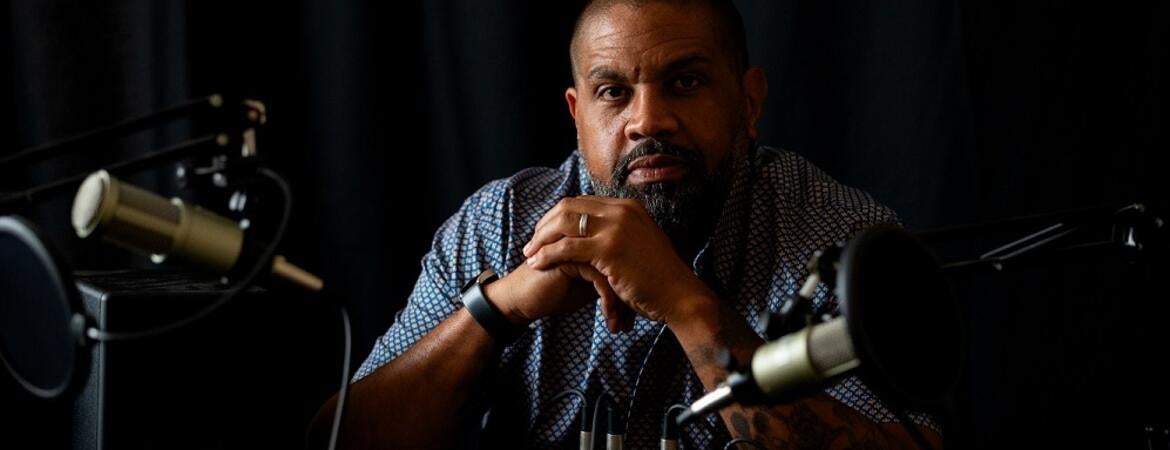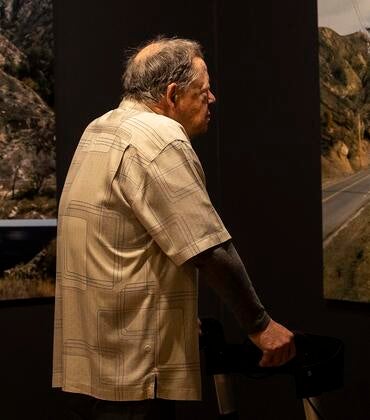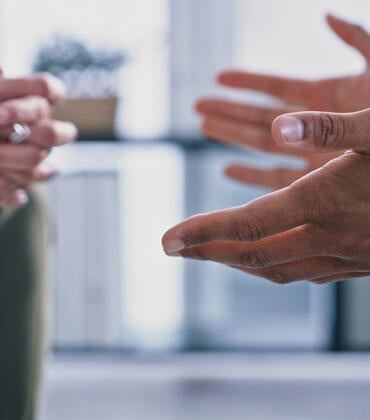
“An experience that I went through as a kid was the lack of a father.”
Over the next 39 minutes, the 20-something Latino male detailed how his parents’ separation led him to pull away from his family. He was 7 or 8 years old when his dad moved out, but no one really talked to him about why.
“I assumed that I did something wrong,” he said. “I was so confused. I guess that’s when I became more violent.”
It wasn’t until his early twenties that his father finally told him the reason they separated was that he had cheated on his mother.
“I felt relieved when I found out that it wasn’t my fault.”
This story is one of over 200 in The Empathy Archive, a collection of first-person narratives gathered at UC Riverside to help young people understand each other better.
“We're thinking about themes that are foundational to a young person's experience in the United States,” said Anthony Jerry, the archive’s creator and a UCR associate professor of anthropology and Black study. “Experiences that have defined people's being today, and will continue to define their being tomorrow.”
By gathering childhood and teen experiences, and discussing them in classrooms, Jerry aims to help high schoolers better understand their peers, create space to share their own experiences, and know they’re not alone.
Building empathy
“Really what this work is trying to do is build social literacy,” said Jerry.
Jerry was 6 years old the first time someone called him the “N-word.” He didn’t know what it meant then, but everyone else present did, regardless of race. When Jerry’s own son asked him what the word meant, he thought about how moments like this create common experiences to which not everyone can relate.
“I realized how our society makes Black people carry the weight of that word,” he said.
He created The Empathy Archive to help people understand experiences they haven’t had themselves, and thus better understand others.
Currently, the archive focuses on nine themes, identified as critical for today’s youth by UC Riverside students. These include narratives about police brutality, coming out, mental health journeys, hearing the “N-word,” health care, foster care, incarceration, being a veteran, and being first-generation American. Though the stories focus on events from childhood, the interviewees range from age 18 to over 40 from all races, genders, and backgrounds.
The archive’s first stories aim to address sexual, racial, and gender discrimination, but as it grows, Jerry and the students working on the project are continuously exploring new themes.
Working on the project has helped Ashley Sanchez Montoya ‘25 engage more deeply in conversations.
“I used to say, ‘I’m here for you if you need to talk,’ but now I really aim to talk properly,” she said. “You never know what people are really going through.”
In the classroom
Though schools provide the major context for how young people engage with society, Jerry has found schools lack the resources to fully address young people’s experiences, particularly those of Black, Latino, and LGBTQ+ teens. When resources exist, they tend to focus more on victims than broader issues.
Many students have “never really thought about the shared aspect or the meaning of their experiences,” said Jerry. Hearing stories that resonate, and creating space to share their own, has given students a “feeling of release and relief,” and helps their fellow students better understand what their classmates have been through.
“We’re all humans,” said Sanchez Montoya, “but we all experience different things.”
The archive is already free and available online for teachers and the public. Jerry is working with educators to create lesson plans and tools to help facilitate discussions around the narratives, soliciting feedback through workshops and presentations with local teachers and at conferences, PTA meetings, and school board meetings.
“The real key is creating a safe space for dialogue,” said Jerry, “to build these social and emotional learning skills.”
An 11th grade class piloted in-school discussion. The students broke into groups to listen to and discuss a narrative, then presented it to the class. The class identified common threads, and the ensuing dialogue motivated some students to share their own, related stories.
“Students thoroughly enjoyed the experience,” said Cherrilynne Hollowell, the teacher who facilitated the pilot class. “They loved how the archive allowed them to draw conclusions and to make connections to their own experiences.”
The goal is to create empathy.
“By helping to recognize that they are not alone in their experiences, and that others are interested in hearing what they have been through, the archive helps to create connections,” said Jerry. “It's my hope that making these connections is a step towards healing, on both a personal and a community level.”
Audio selections from the archive:



